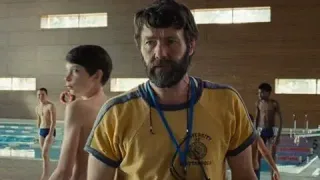August 24, 2023
Review: 'Fremont' is a Dry, Quirky Tale of a Refugee Finding Herself in America
C.J. Prince READ TIME: 3 MIN.
Distinctive would be the key word to describe "Fremont" the latest feature by Iranian filmmaker Babak Jalali. Setting his sights on the Bay Area town of Fremont and its high population of Afghan immigrants, Jalali tells the story of a refugee trying to figure themself out as they try to adapt to a new life after fleeing Afghanistan. Shot in black and white in the boxy Academy aspect ratio, "Fremont" stands out in its portrait of modern-day America through the eyes of a new arrival to the country. It's filled with quirks and a bone-dry sense of humor, although its wry, fleeting approach leaves more to be desired.
The central character of "Fremont" is Donya (Anaita Wali Zada), who worked for the U.S. Army as a translator until she had to evacuate her home country after the Taliban took over. With no family in America and no way to get back home (her work for the Army means she's seen as a traitor in Afghanistan), she creates a simple routine for herself: Every morning, she commutes from Fremont to San Francisco to work at a fortune cookie factory, and in the evenings she spends time alone, with a coworker, or around fellow Afghan immigrants and refugees who live in the same apartment complex.
Despite the monotony of her day-to-day life, Donya can't sleep and finds herself dissatisfied. She swaps places with a neighbor in a therapy program, and starts to have regular appointments with Dr. Anthony (Gregg Turkington) in the hopes of getting sleeping pills. Her therapy sessions aren't exactly productive, as Dr. Anthony's attempts to get Donya to open up never really work; at one point she says she has no ties to America, and would have been fine to move to somewhere in Europe if she had the chance.
Donya's own trajectory as a character creates an awkward tension within "Fremont," one that pits the film against itself. There's an emphasis on figuring out Donya's psychology and feelings, like how Dr. Anthony suggests she may be suffering from PTSD, yet Jalali's direction creates too much distance. The camera stays locked down and precise in its framing, and lines get delivered in a purposefully stilted, dry manner. Jalali's film is too filled with stylistic affectations that distract from the emotional moments it wants to land, like when Donya cries while watching her coworker sing karaoke. As nice as "Fremont" may look, it's too fussy over its surfaces to go deeper as a character piece.
It's unfortunate since Wali Zada, a non-professional acting for the first time, has a natural screen presence and charm that feels hampered by the limitations of the script and direction. In terms of plot, a development that gets Donya promoted into a role writing fortunes creates a mode of expression for her but ends up petering out ("The fortune you seek is in another cookie" reads one of them, a good example of the film's penchant for jokes that might be too low-key for their own good). And the final act, where Donya crosses paths with a modest mechanic (Jeremy Allen White, in an extended cameo), doesn't land as well as it wants to in giving Donya's arc some sense of closure either, giving an abrupt, unsatisfying conclusion.
"Fremont" gets some points for originality and strong performances from its ensemble, but it's too wispy to have much staying power. Like the fortune cookies Donya makes, it's a mild curiosity, with as much meaning as one wants to put into it.






